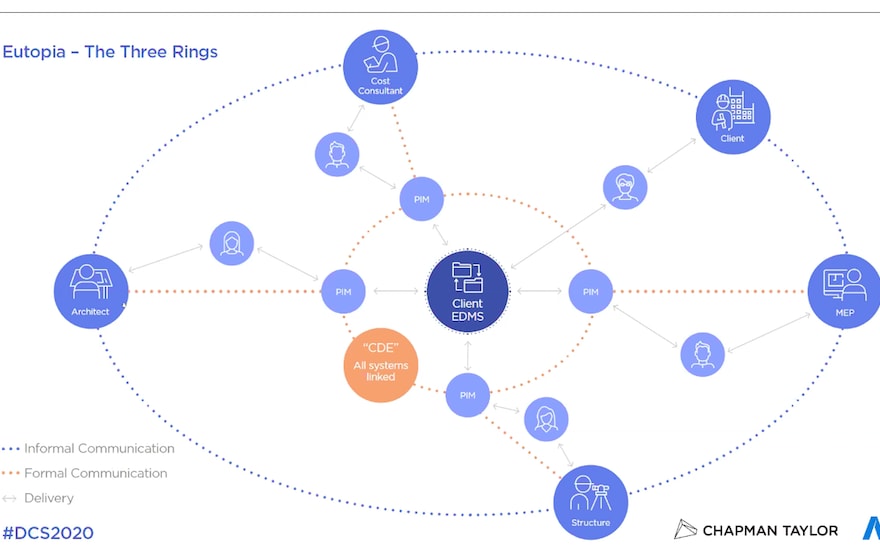Construction is on a data sharing journey from chaos (image above) to utopia (scroll down the page), according to Chapman Taylor Architects’ Stephen Higgon.
Speaking at the Digital Construction Summit 2020, the senior information manager at the architecture practice and masterplanner Chapman Taylor revealed internal research that showed the vast majority of people in a design team on a project are using email to share data rather than use the designated data management system.
During the Atvero-sponsored webinar on the power of data and its potential, Higgon said 92% of project design teams are using email to collaborate rather than use the system they are meant to use. Furthermore, 80% struggled with version control – as highlighted in the ‘perfect chaos’ image. Nearly two hours of every day are lost to time spent searching for and gathering information; and this work overload decreases productivity by 68%.
In order to combat thee business impacts, he described his dream for data sharing (image below): “Eutopia for me is three rings [see image below]. The first ring is informal communication: emails, messaging, telephone calls, meetings, etc – this happens naturally.
“But once communication needs to be formal and there needs to be work-in-progress and an audit trail, systems begin to talk each other. If the cost consultant makes a comment, everyone can see it. It means no matter what we know where our documents are, we can track them and audit them.
“The final element is delivery: what the client wants to see at the end of the project without seeing all the chat and all the issues that happen beforehand.”

Stephen Higgon’s dream of data sharing in a design project team
Higgon acknowledged the obstacles: “This is just a dream and there are obstacles around insurance, systems that don’t currently talk to each other, and [getting] buy-in from the project team to work in this method and see its benefits.
“I’d like a single point of access to all project information via Microsoft Teams with Atvero. That will combat the time and productivity losses.”
Behavioural change
The webinar panellists endorsed the need for behavioural change training to help drive informal data sharing out of day-to-day operations.
Liam Southwood, customer support and services director at Atvero, said: “Behavioural change is absolutely critical to the delivery of information on a project. The informal exchange of information is reality. The stick is very rarely the answer; so the carrot is giving them a system they want to use and processes that work for them.”
Higgon at Chapman Taylor agreed: “Behavioural change absolutely needs to be part of the solution. The new way of working is a huge cultural change.”
Dr Jennifer MacDonald, senior BIM consultant at PCSG, reported strong interest from clients: “We’re definitely seeing more and more interest from our clients in such training. People/process/technologies: you can’t deal with one in isolation from the other.”
Michael Hudson, associate director at Turner & Townsend, highlighted the need to understand and learn from how behaviours have changed in other sectors: “We should be looking outside of our environment and gleaning best practice of how behaviour has already changed [in the next generation] and bring that to construction.”
Watch the webinar on demand: https://us02web.zoom.us/webinar/register/WN_7vhdefjWT8yZladTz5F8rA
For more information on Atvero, go to: https://www.atvero.com











